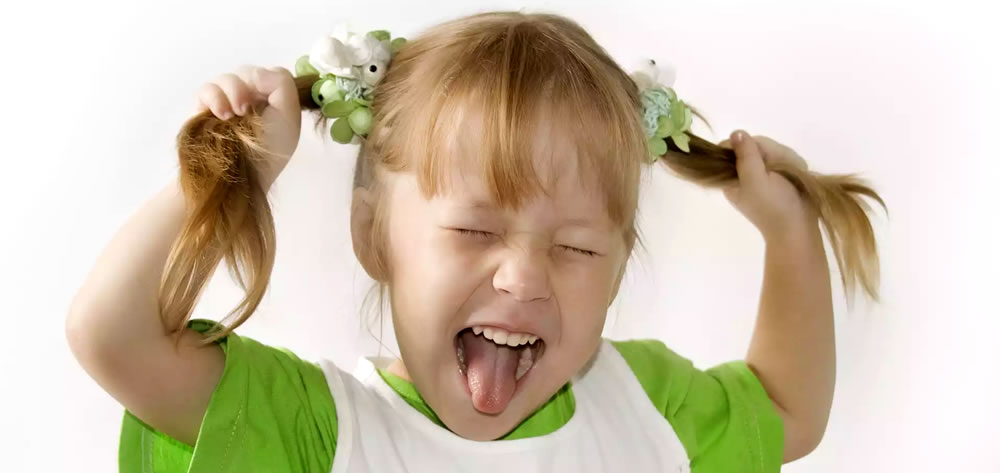How to raise an obedient child?
Children often act up and throw tantrums, and do it at the most inopportune moment. Parents at first ask their child to calm down, but soon many of them lose their patience and move on to the head of the head. As a result, children's cries only intensify, and adult life turns into a real test. Why does the child become uncontrollable, and how to adjust his behavior?

Reasons for childhood hysteria
All children periodically experience the patience of their parents and do things that make them awkward. According to experts, there is a rational justification for this. Screams and tantrums are just natural stages of development.
According to Emily Emmott, biologist and anthropologist at University College London, the main problem is the time parents spend with their children. It may seem to an adult that the child is getting enough attention. The baby, however, needs mom and dad to be around constantly and belong only to him. Children still do not understand that adults have work, friends and personal affairs, which they also require strength for.
A little man does not know how to correctly explain to parents that he lacks their love and care. The easiest way for a child to draw attention to himself is to scream loudly and stomp his feet. The fact that the desires and needs of others is important to consider is obvious for adults, but not for children. Understanding these things is not given to a person from birth, but comes only with experience. The child sincerely believes that he should always get what he wants. If his whim is not fulfilled, the baby tries to achieve the desired method available to him, that is, hysteria.
We also read:How to deal with childhood hysteria: advice from a psychologist
Is child misbehavior - normal or abnormal?
All babies are deeply individual, and each may have its own motives for disobedience. It is a detailed analysis of the causes of the child’s bad behavior that is the key to his “correction”. To understand where the roots of moods and tantrums grow from, use the following recommendations:
1.Consider the "functional age" of the child
Parents often throw phrases like "stop acting like a baby!" To their children. They are sure that as they grow older, the child should become more serious. However, all children develop at different rates, under the influence of certain factors. Therefore, when assessing their behavior, it is not always worth focusing on the date indicated in the birth certificate.
Psychologists advise parents to understand how old their child's developmental level is. In one area, a child may be ahead of their peers, in another - a little behind. This is absolutely normal. Especially often, such contradictions in behavior are found among adolescents. An 11-year-old child can talk like an adult, swing his rights, and at the next moment - ask him to straighten his blanket before going to bed, to cook something tasty.
2. Keep a diary of behavior
Adults can find it difficult to put themselves in the place of the child and see what is happening through his eyes. Therefore, they often think that there is no reason for bad behavior, but this does not happen.
Parents should keep a diary, describing in it changes in the behavior of the baby, namely:
- everything that preceded the scandal;
- events after which the baby calmed down;
- how the days went by when the child was obedient and calm.
Such a method will help to build a chain of events and identify factors that provoke outbreaks of anger.
3. Do not be afraid to see a doctor
Problems with the behavior of children are often caused by the characteristics of age and pass by themselves when the child grows up. However, there is one thing: if the parents do not understand the exact reasons for the tantrums of their child, they will react incorrectly. Reproaches, slaps, retaliatory aggression in no way contribute to good education.
Are you greatly alarmed by the behavior of the child? Do not be afraid and do not hesitate to contact a therapist. If your baby has health problems, it is important to make a diagnosis and treatment as soon as possible. However, most likely, the doctor will advise you a good child psychologist. He will talk with the baby and determine why he is throwing tantrums. Having learned what causes negative reactions in a child, you can eliminate them.
4. Discuss problems with other parents
Psychologists urge parents to explore the experience of other people with children of the same age - friends, relatives, good friends. Raising a child is really difficult. All parents have problems with the behavior of their children, so there is nothing shameful in discussing them.
Perhaps someone will start to build the most experienced teacher out of himself and insist that he knows exactly what your problem is. However, in general, conversations with other parents will allow you to better understand when and why children's behavior gets out of control. You will be able to discover factors that you did not pay attention to before.
We also read: 10 reasons for poor child behavior
Obedient child care allowance

Raising a child is a complex and responsible process. Parents know their children well, but often find themselves helpless in the face of their tantrums. Therefore, it is irrational to rely only on one's own strength. Invaluable help in upbringing can be provided by the recommendations of experienced specialists who managed to communicate with a large number of families and conduct a lot of research on the subject of how various factors affect the behavior of a child.
Sleep control is the key to good behavior.
In 2013, English scientists conducted a large-scale study among 10,000 children aged 3-7 years. The results showed that there is an objective relationship between the abnormal night sleep regimen and the poor behavior of the child during the day.
According to Yvonne Kelly, professor at the Department of Epidemiology and Health at University College London, an unstable day regimen affects not only the body, but also the mind of the child. In such conditions, he experiences something similar to the sensations when changing time zones.This impedes healthy development and causes behavioral abnormalities. Violations of sleep patterns in preschool age can also provoke serious health problems that will remain for life.
The longer the child does not get enough sleep, the more disturbances in his behavior are manifested, namely:
- hyperactivity;
- emotional instability;
- difficulty communicating with peers.
The good news is that all negative consequences are reversible. If parents begin to control the child’s sleep patterns, soon his behavior will begin to improve.
What is good and what is bad
According to Rachel Kelem, a professor at the University of Massachusetts, the task of parents is to teach the child how to behave properly. Adults must establish the boundaries of what is permitted and constantly explain that they cannot be violated. Even babies respond well to learning. When the baby is already 3 years old, he can directly say: “If you don’t stop being outrageous, you will have to go to your room and sit there a little alone until you calm down.”
It is important to start the educational process as early as possible, because the teenager will not succeed in instilling anything. When a child behaves well, along with praise, he needs to explain what exactly he did right. The kid should remember what to do. Did he put the toys in a box? The simple word "well done" is not enough. Tell him that you are grateful to him for the help in cleaning, or pay his attention to how cozy and beautiful it became in the room. Next time he will want to help his mother.
Praise for formulating a pattern of behavior
It is important for children to feel the care and approval of their parents - this is what they often achieve with their tantrums. Praise them not only for exemplary behavior, but even for trying to do something good.
It is important for parents to understand that they themselves often make mistakes, so it’s wrong to demand ideal actions from children. The baby's brain will form until adolescence. He is not yet able to rationally evaluate actions and make the right decisions. It takes a lot of time and effort of parents to teach a child to behave well and to unlearn how to behave badly.
Approval from loved ones will help the baby remember what to do. It will be a great motivation to act well. The child needs parental caress and does not want to upset them, but just does not yet understand what adults expect from him.
No to war of interests
A professor at the University of Massachusetts, Rachel Kelem, advises parents to be steadfast and not bend under the child. The kid made a scandal because he did not buy a toy? Decide how you will act and stick to your decision until the end.
The child quickly calculates that if you shout longer and louder, the parents at some point will not stand it and make concessions. As a result, he begins to manipulate adults and scream every time he does not get what he wants. If you feel that this time you can’t stand it for long, give in before hysteria starts. So you take care of your nerves and the calm atmosphere in the house. If you decide not to concede, stand your ground to the end, no matter how much the baby cries. In the end, he will understand that the manipulation did not work, and he will calm down.
What is not worth doing?

Sometimes parents, without knowing it, can provoke the baby into scandals and tantrums. If you want to raise an obedient and calm child, do not make the following mistakes:
1. Do not show your children anger
Like sponges, children absorb everything that they “spy” on their parents. If you show your anger towards them, they will mirror your behavior and will often throw you tantrums.
Of course, all parents are periodically angry with their child. However, to explain to the baby that he is doing badly, it is possible without swearing, David Spellman, a child therapist from Lancashire, insists.The specialist explains that the parents do not even realize how much they injure their child, talking with him irritably. Raising children, you need to show remarkable patience and find a balance between rigor and kindness.
If the child is behaving badly, he needs to clearly state what he is doing wrong. If you scream, the baby just will not hear you. Pronounced in an angry voice will seem incomprehensible to him. As a result, the child only harbors a grudge and becomes outrageous to spite parents.
2. Do not read notations
When raising a child, the carrot works more efficiently than the stick. The person who was punished in childhood remembers this in adulthood and holds a hidden grudge. Parents always explain to their mature child that they scolded him for his own good. However, experts are sure: punishments cause only negative consequences.
According to Professor Köhl, it is better for parents to focus their children on the moments when they are doing something right, and less to blame them for their bad deeds. In this case, in the consciousness of a small person, what is good is deposited. He will try to behave as necessary in order to earn parental approval. Continue to praise and encourage him for his efforts, so that the child continues in the same spirit.
3. Do not remove the "golden stars" for breaking the rules
A popular method for monitoring the behavior of children is tablets. They help parents get their child to fulfill their requests. If he does a good deed (he removes toys, makes a bed), a star is attached to the plate, but it is removed for misconduct. Doing so is a huge mistake, says Professor Kelem.
The specialist explains that star plates are a great way to negotiate with a child. He sees his achievements and expects to be further encouraged. The kid deserves every star. This is a result that is not subject to revision. If the child is behaving badly, focus his attention on the fact that he was left without a new star, but do not take away the deserved ones.
4. Do not put the kids in the corner
Professor Kelem explains that changing activities is a very effective method of influencing naughty children. However, "pulling" the child out of a situation in which he behaves badly, you need to sharply, without abuse and violence. When sending a baby to a corner, parents literally hang on their child the label "you are bad." How can he correct his behavior if you yourself suggest to him that he cannot do otherwise?
You can’t say aloud phrases like "you are a terrible child", "I am ashamed of your behavior." It’s better to softly tell the baby that he is too divorced, and ask him to go sit in his room a couple of minutes to recover.
Parents need to remember one thing: by bad behavior, the child often tries to get them to spend more time with him. Yes, in this case, it causes adult discontent and risks being punished. However, the child is satisfied with any attention from the parents. Try to spend more time with your little one when he behaves well. This will be the best encouragement for the baby, which he will try to get with all his might.
We also read:
What to do if a child behaves badly - advice from a child psychologist Julia Milovanov
Naughty child - School of Dr. Komarovsky









I calmly deal with bad behavior. It is enough to threaten that I will tell everything to dad (the child is 5 years old, he already understands a lot) and the bad behavior ends. The child has developed a little fear and a lot of respect for his father, so it’s easy for me to suppress tantrums and stuff.
I devote a lot of time to children, try to borrow something, play together, put things in order together. I was lucky with the children, there are no vagaries. I do not swear and do not raise my voice, but when a controversial situation arises, I offer two options for a solution and give the right to choose.